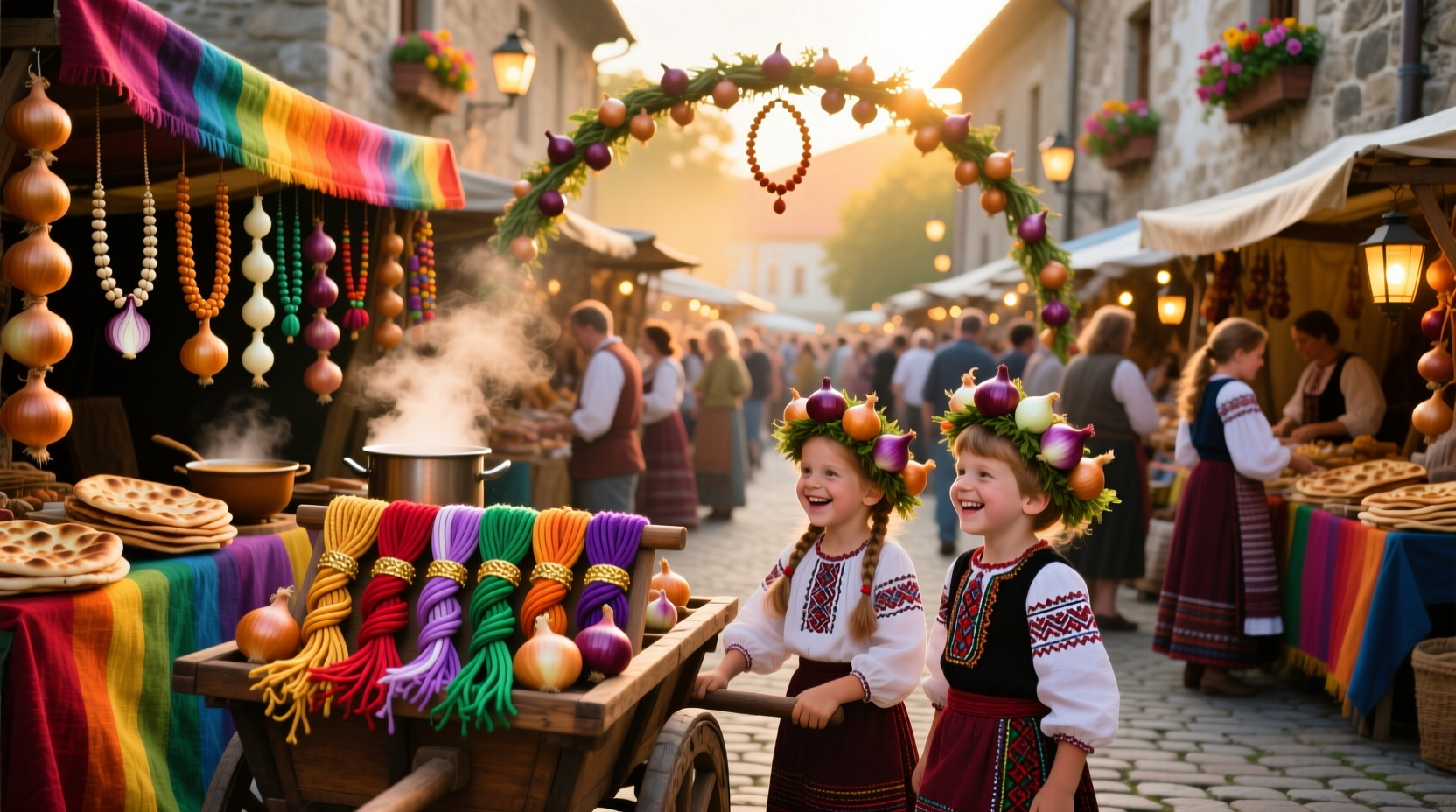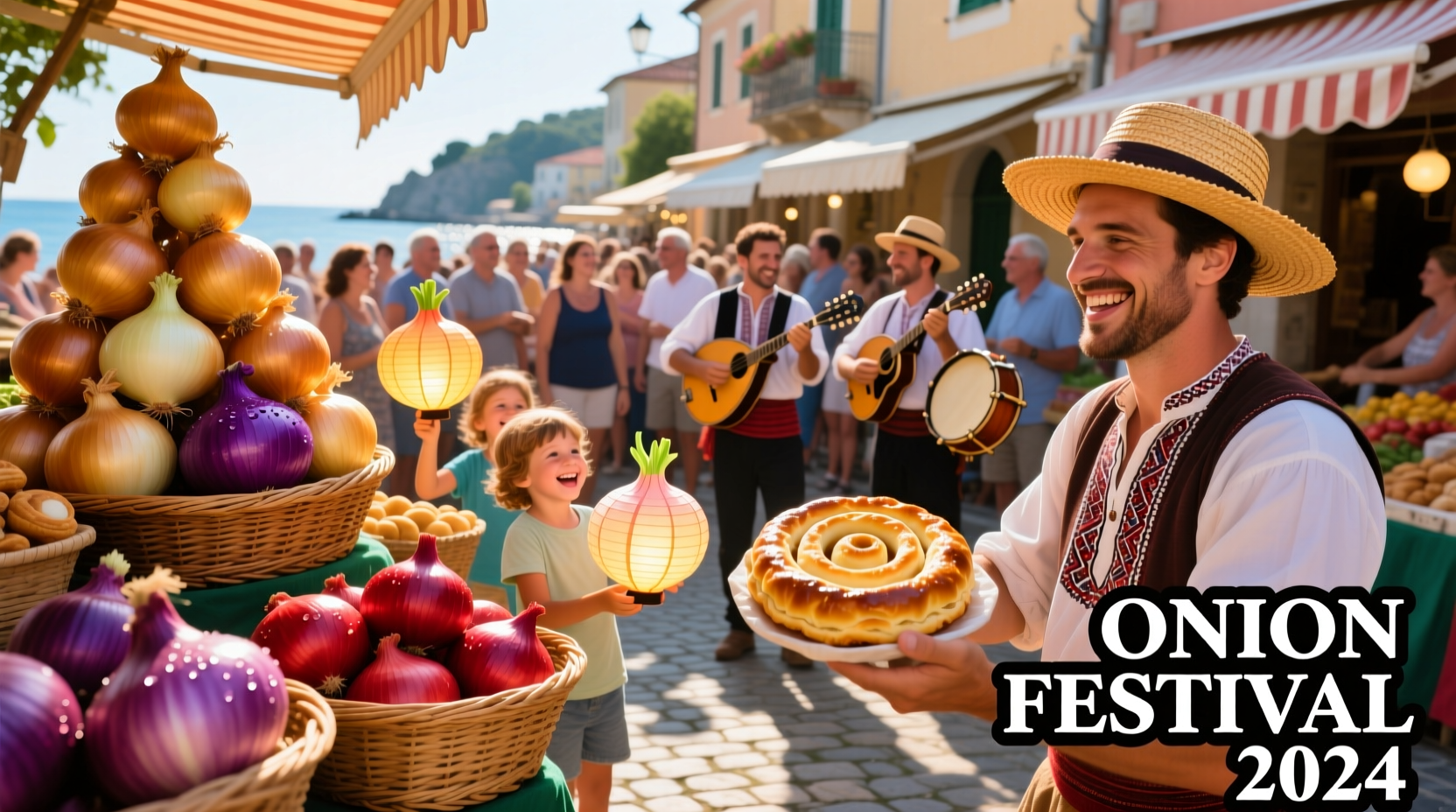Onion festivals are vibrant cultural celebrations held worldwide that honor the humble onion through food, music, competitions, and community events. These festivals typically feature onion-themed dishes, cooking demonstrations, agricultural exhibits, and family-friendly activities, with the largest being the Gilroy Garlic Festival in California (despite its name, featuring significant onion elements) and Spain's famous 'La Tomatina' which includes onion-related traditions.
Why Onion Festivals Matter More Than You Think
While they might sound unusual at first glance, onion festivals represent centuries of agricultural tradition and cultural identity. These events aren't just about the pungent vegetable—they're community anchors that preserve culinary heritage, support local farmers, and create economic opportunities in regions where onion cultivation defines the landscape. Whether you're a food enthusiast planning your next culinary adventure or simply curious about unique cultural traditions, understanding onion festivals reveals surprising connections between agriculture, community, and identity.
The Rich History of Onion Celebrations
Onion festivals trace their origins to ancient agricultural societies that relied on alliums as staple crops. Unlike modern celebrations, early onion-related gatherings served practical purposes—marking harvest seasons, ensuring community food security, and honoring deities associated with fertility and agriculture.
| Era | Development | Cultural Significance |
|---|---|---|
| Ancient Egypt (3000 BCE) | Onions used as worker payments for pyramid construction | Symbolized eternity due to concentric circles; featured in burial rituals |
| Medieval Europe | Church-blessed harvest festivals included onion displays | Onions represented protection against disease; featured in medicinal displays |
| 19th Century America | County fairs incorporated onion-growing competitions | Demonstrated agricultural prowess; measured by size and quality |
| Modern Era (1970s-present) | Dedicated onion festivals emerged globally | Celebrate regional identity; blend tourism with agricultural heritage |
This historical evolution shows how onion celebrations transformed from survival-focused harvest acknowledgments to vibrant cultural events that now attract thousands of visitors annually. According to the USDA National Agricultural Statistics Service, specialty crop festivals like onion celebrations now contribute significantly to rural economies, with some generating over $2 million annually for host communities.
Top Onion Festivals Around the World
While many regions host onion-related events, certain festivals have gained international recognition for their scale, authenticity, and unique cultural expressions. These aren't just local affairs—they've become destination events that showcase how a simple vegetable can unite communities.
Gilroy Garlic Festival (California, USA)
Despite its name, this festival features substantial onion elements as part of its allium celebration. Held annually since 1979 in California's "Garlic Capital of the World," it attracts approximately 100,000 visitors over three days. The festival includes:
- Onion-eating contests with professional competitors
- Cooking demonstrations featuring caramelized onion specialties
- Agricultural exhibits showcasing regional onion varieties
- Family activities including onion-themed arts and crafts
Valladolid Onion Festival (Spain)
This lesser-known Spanish festival in Castile and León celebrates the region's prized "Cebolla de Fuentes" onion, recognized with Protected Geographical Indication status by the European Commission. The festival features:
- Traditional onion harvesting demonstrations
- Culinary competitions centered around "migas" (a bread and onion dish)
- Historical reenactments of medieval onion trading practices
- Onion weaving workshops preserving ancient craft techniques
Surprise Valley Onion Festival (California, USA)
One of America's most authentic onion celebrations, this festival in Modoc County has operated continuously since 1910. What makes it special:
- Showcases the unique "Surprise Valley Sweet Onion" variety
- Features the "Onion Toss" competition where participants throw onions for distance
- Includes historical exhibits about the region's onion farming heritage
- Maintains traditional preparation methods unchanged for decades

What to Expect When Attending an Onion Festival
First-time attendees often underestimate the sensory experience of onion festivals. Beyond the obvious aroma, these events offer immersive experiences that engage all your senses while providing valuable insights into agricultural traditions.
The Culinary Experience
Onion festivals showcase the vegetable's remarkable versatility through dishes you won't find elsewhere:
- Caramelized onion specialties: Slow-cooked to perfection, transforming sharpness into sweet complexity
- Onion blossom displays: Intricate carvings demonstrating culinary artistry
- Regional variations: From French onion soup competitions to Indian samosa tastings
- Unexpected pairings: Onion-infused desserts and beverages that challenge preconceptions
According to culinary anthropologists at the University of Gastronomic Sciences, "onion festivals represent living museums of culinary adaptation, where traditional preparation methods meet contemporary creativity."
Practical Considerations for Attendees
While exciting, onion festivals present unique considerations that first-time visitors should understand:
| Consideration | Recommendation | Why It Matters |
|---|---|---|
| Eye irritation | Bring sunglasses and consider contact lenses over glasses | Onion vapors cause more discomfort with eyeglasses |
| Clothing choices | Wear washable fabrics; avoid delicate materials | Onion oils can stain certain fabrics permanently |
| Transportation | Use public transit or park at festival-designated lots | Local roads become congested; parking scarce near venues |
| Dietary restrictions | Bring alternative snacks if onion-sensitive | Cross-contamination common in festival food environments |
Planning Your Onion Festival Visit
Successful festival attendance requires more than just showing up. Strategic planning enhances your experience while supporting the communities that host these events.
Timing Your Visit
Most onion festivals follow agricultural calendars tied to harvest seasons:
- Early summer (June): Best for sweet onion varieties in northern hemisphere
- Late summer (August): Peak for storage onion varieties
- Weekday vs. weekend: Weekdays offer more interaction with growers; weekends feature more entertainment
Local tourism boards like Visit California report that weekday attendance at agricultural festivals has increased 27% in recent years as travelers seek more authentic experiences.
Economic Impact Awareness
Understanding the economic context of these festivals helps visitors appreciate their significance beyond entertainment:
- Small farming communities often rely on festival revenue for 15-25% of annual tourism income
- Purchasing directly from growers supports sustainable agricultural practices
- Attending educational components helps preserve traditional farming knowledge
Bringing the Festival Home
You don't need to attend a festival to appreciate onion traditions. Incorporating festival-inspired practices into your kitchen connects you with global culinary heritage.
Home Cooking Techniques from Festival Experts
Professional chefs at onion festivals employ specific techniques worth replicating:
- Layered caramelization: Cooking onions slowly over multiple temperature stages
- Varietal selection: Choosing specific onions for particular dishes (Vidalia for sweetness, Spanish for structure)
- Waste reduction: Using onion skins for natural dyes and stocks, as demonstrated at sustainable farming exhibits
- Preservation methods: Traditional pickling and drying techniques showcased at heritage booths
Cultural Appreciation Beyond the Kitchen
True appreciation of onion festivals extends beyond recipes:
- Learn about the agricultural challenges onion farmers face
- Understand regional naming conventions for onion varieties
- Explore historical cookbooks featuring traditional onion preparations
- Support organizations preserving heirloom onion varieties
Frequently Asked Questions
Are onion festivals only about eating onions?
No, onion festivals celebrate the entire agricultural and cultural ecosystem surrounding onions. While food is prominent, these events typically include agricultural education, cooking demonstrations, historical exhibits, community competitions, and entertainment. Many festivals focus on sustainable farming practices and feature exhibits about soil health, crop rotation, and heirloom varieties.
What's the best way to experience an authentic onion festival?
For an authentic experience, arrive early when growers are setting up, participate in educational workshops rather than just food tasting, talk directly with farmers about their cultivation methods, and explore beyond the main food stalls. Weekday visits often provide more interaction with producers, and purchasing onions directly from growers supports the agricultural community that makes these festivals possible.
Do onion festivals occur outside the United States and Europe?
Yes, onion festivals exist worldwide, though they may not always be explicitly named as such. India's Kanda Utsav celebrates onion harvests in Maharashtra, Japan hosts scallion festivals in certain regions, and parts of Africa feature allium celebrations tied to local varieties. These events often incorporate regional preparation methods and traditional dishes specific to local culinary traditions.
How do I deal with the strong onion smell during the festival?
Bring sunglasses to reduce eye irritation, consider wearing contact lenses instead of glasses, and carry lemon slices to rub on your hands and wrists (citric acid neutralizes onion odors). Many festivals provide lemon water stations specifically for this purpose. Wearing washable clothing is recommended, as onion oils can sometimes cause stains on certain fabrics.
Are onion festivals suitable for children?
Most onion festivals offer family-friendly activities including onion weaving workshops, agricultural education exhibits, and cooking demonstrations designed for young audiences. Many festivals have designated children's areas with activities that teach about farming in engaging ways. However, the strong smells might bother very young children, so bringing snacks they enjoy and planning shorter visits may be advisable for families with toddlers.











 浙公网安备
33010002000092号
浙公网安备
33010002000092号 浙B2-20120091-4
浙B2-20120091-4